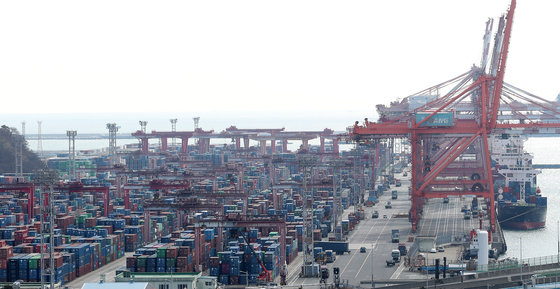The International Monetary Fund (IMF) raised its forecast for Korea’s economic growth rate this year to 2.3%, up 0.1 percentage points from the previous forecast. However, it did not reach the upward growth rate of major countries such as the United States, which are showing strong resilience due to concerns about domestic consumption and the crisis in the construction sector.
In its January ‘World Economic Outlook’ update report on the 30th (local time), the IMF said, “Dark clouds are disappearing over the world economy,” and “the likelihood of a soft landing for countries suffering from high-intensity austerity has increased.” Accordingly, Korea’s growth rate forecast of 2.3% for this year presented by the IMF is somewhat more optimistic than the expectations of the Ministry of Strategy and Finance (2.2%) or the Bank of Korea (2.1%).
In an interview with the Dong-A Ilbo, Krishna Srinivasan, IMF Asia-Pacific Department Director, said, “The growth rate of Korea’s major trading partners, such as the United States and China, is expected to be higher than expected.” “It was slightly raised,” he said. However, he explained, “Domestic demand momentum, including consumption and construction investment, is weakening, offsetting (export growth projections).”
 2024.1.25. News 1
2024.1.25. News 1Every year, the IMF publishes the World Economic Outlook in April and October and the World Economic Outlook Update Report in January and July. This month’s update report shifted its focus to optimism compared to last October. This is interpreted to be based on expectations arising from the strong growth in the United States and the expansion of China’s fiscal spending. Pierre Olivier Gaurinchas, Chief Economist at the IMF, diagnosed, “The global economy is maintaining its growth trend amidst a steady decline in prices and is beginning its final descent toward a soft landing.”
In fact, the IMF adjusted the global economic growth rate to 3.1%, 0.2 percentage points higher than the previous forecast. For the United States, it rose by a whopping 0.6 percentage points to 2.1%. As the U.S. Department of Commerce recently announced that the economic growth rate for the fourth quarter of last year (October-December) was 3.3%, well exceeding the market forecast of 2%, it was predicted that the U.S. economy would lead the global economy to recovery. . The Chinese economy, where concerns about low growth are growing due to the real estate crisis, is also expected to record a growth rate of 4.6% this year thanks to the government’s active intervention in fiscal spending.
On the other hand, countries such as Korea and Germany, which do not have a solid domestic economy to withstand high interest rates and high prices, are expected to have difficulty in economic rebound. Germany’s growth rate this year was predicted to be 0.5%, down 0.4%. Srinivasan, IMF Asia-Pacific director, also said about Korea, “The recovery in the semiconductor sector may be weaker than expected, and raw material prices are highly volatile due to geopolitical conflicts. He expressed concern that future real estate market adjustments could also act as a risk.
The IMF warned, “Even if the global economy moves toward a soft landing, various crisis factors such as overall low growth, two wars, and a ‘super election year’ remain.” In fact, the IMF’s forecast for this year’s global economic growth rate of 3.1% is significantly lower than the 3.8% average between 2000 and 2019.
In particular, the outlook for global trade, which supports Korea’s economic growth, is worsening. This year’s global trade volume growth rate forecast is 3.3%, a significant drop from the past average of 4.9%. In particular, concerns about the escalation of the Middle East war and heightened tensions in the Red Sea are likely to have a serious impact on the global economy, including a surge in logistics costs. Srinivasan, director of the Asia-Pacific Department, said, “The Korean economy is particularly vulnerable to the risks of a situation where the world economy is fragmented and trade is slowing down,” and “it may also be negatively affected by the volatility of raw material prices due to the intensification of the war in the Middle East.”
As the ‘super election year’ approaches, protectionism is becoming stronger in many countries, including the United States, and trade regulations may be expanded, which is also a pessimistic factor for the Korean economy. According to the IMF, the number of trade restrictions in countries around the world was about 1,100 in 2019, but the number nearly tripled to 3,000 last year. Although the IMF did not directly mention the US presidential election, concerns are growing that the trade war and America-first policy could accelerate if former President Donald Trump returns to power.
Additionally, the IMF pointed out that “market expectations for an interest rate cut in March are overly optimistic.” It is expected that the United States, Europe, and the United Kingdom will maintain the current interest rate level until the second half of the year (July-December).
New York =
Sejong =
Source: Donga
Mark Jones is a world traveler and journalist for News Rebeat. With a curious mind and a love of adventure, Mark brings a unique perspective to the latest global events and provides in-depth and thought-provoking coverage of the world at large.